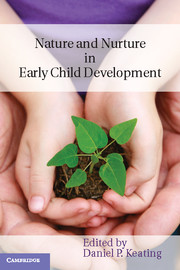Book contents
- Frontmatter
- Contents
- Contributors
- Acknowledgments
- Introduction
- 1 Biological and Experiential Influences on Psychological Development
- 2 Neural Development and Lifelong Plasticity
- 3 Mother and Child: Preparing for a Life
- 4 Early Experience and Stress Regulation in Human Development
- 5 Biology and Context: Symphonic Causation and the Distribution of Childhood Morbidities
- 6 Understanding Within-Family Variability in Children's Responses to Environmental Stress
- 7 Origins, Development, and Prevention of Aggressive Behavior
- 8 Mental Health Intervention in Infancy and Early Childhood
- 9 Bringing a Population Health Perspective to Early Biodevelopment: An Emerging Approach
- 10 Society and Early Child Development: Developmental Health Disparities in the Nature-and-Nurture Paradigm
- Index
- References
7 - Origins, Development, and Prevention of Aggressive Behavior
Published online by Cambridge University Press: 03 May 2011
- Frontmatter
- Contents
- Contributors
- Acknowledgments
- Introduction
- 1 Biological and Experiential Influences on Psychological Development
- 2 Neural Development and Lifelong Plasticity
- 3 Mother and Child: Preparing for a Life
- 4 Early Experience and Stress Regulation in Human Development
- 5 Biology and Context: Symphonic Causation and the Distribution of Childhood Morbidities
- 6 Understanding Within-Family Variability in Children's Responses to Environmental Stress
- 7 Origins, Development, and Prevention of Aggressive Behavior
- 8 Mental Health Intervention in Infancy and Early Childhood
- 9 Bringing a Population Health Perspective to Early Biodevelopment: An Emerging Approach
- 10 Society and Early Child Development: Developmental Health Disparities in the Nature-and-Nurture Paradigm
- Index
- References
Summary
What is aggressive behavior? When does it start? How does it develop? Can we prevent the development of chronic physical aggression? These are the four main questions that are addressed in this chapter. Research on the development and prevention of violent behavior is a growing industry. Paradoxically, the more humans become “civilized,” the more they appear to be preoccupied by violence. The development of aggressive behavior is central to most theories of human behavior and is addressed by disciplines as varied as zoology, psychiatry, economy, psychology, public health, and political sciences.
WHAT DO WE MEAN BY “AGGRESSIVE BEHAVIOR”?
It may be a surprise that the major problem with this area of research is one of definition. Investigators have been putting their finger on this problem over and over again, but no simple solution has been found (Berkowitz, 1962; Burt, 1925; Buss, 1961; Cairns, 1979; Coie & Dodge, 1998; Hartup & de Wit, 1974; Parke & Slaby, 1983; Pitkanen, 1969). The best way to observe the difficulties faced by investigators is to examine the content of the “aggression” scales that have been used over the past decades. The content of the scales defines what is measured. The popular scales used to assess children's and adolescents' aggressive behavior contain a mix of behaviors that range from physical aggression to attention seeking and disobedience.
Information
- Type
- Chapter
- Information
- Nature and Nurture in Early Child Development , pp. 169 - 187Publisher: Cambridge University PressPrint publication year: 2010
References
Accessibility standard: Unknown
Why this information is here
This section outlines the accessibility features of this content - including support for screen readers, full keyboard navigation and high-contrast display options. This may not be relevant for you.Accessibility Information
- 2
- Cited by
